#subplots for socialists
Explore tagged Tumblr posts
Text
The writers of DS9: Yeah, we can do our "stranded in the troubled 21st century, our heroes must undo damage to the timeline lest the Federation be erased forever" plot in two episodes.
The writers of SNW: Yeah, we can do our "stranded in the troubled 21st century, our heroes must undo damage to the timeline lest the Federation be erased forever" plot in one episode.
The writers of Picard season 2: We absolutely need ten episodes to tell our "stranded in the troubled 21st century, our heroes must undo damage to the timeline lest the Federation be erased forever" plot. You need one episode to set up the time travel, first of all, then a episode setting up the dark future. How else will the audience understand it if you don't tediously show every detail? Will our longer take be deeper? No, just the same thing with a dozen random subplots. What if everyone had a identical twin in the 21st century? What if Picard's mom had a gothic novel backstory in the socialist future utopia? What if we did a whole episode about how a random FBI agent met a Vulcan once? What if we had one of the main characters be a corpse all season and let another straight up vanish from the franchise after one episode?
292 notes
·
View notes
Note
i would like to hear about the downton abbey that lives in your head
Okay so the downton abbey that lives in my head is largely dependent on which episode I'm watching but what I will say is the titanic connections and the whole branson subplot are much more important because of course I will extrapolate irish history connections in literally anything. additionally, there's a significant subplot surrounding thomas' attempts to convert all the servants to communism because thomas is, in this version, antagonistic because he's a socialist rather than just evil. also I like to pretend it takes place in 1810 instead of in the 20th century. now you see why I called it hallucinating a completely different show rather than just making up fanon
17 notes
·
View notes
Note
Have you seen Oppenheimer, and if so, should I see it? I, knowing nothing about the movie, just sorta assumed it was either history-related or historical fiction and never learned anything about it or mustered up the give-a-damn to give it a shot (I am not a history buff).
You know...
I saw it...and I generally liked it...but I honestly think that it was kind of messy.
Like here's the thing about historical fiction...most people are not atomic bomb/Oppenheimer experts.
So they don't know most of this stuff by heart.
They remember shit like the Manhatten project and they know jfk and they know truman. They know America dropped atomic bombs on Japan.
But oppenheimer the movie like...throws so much shit at you, without even bothering to give you the context?
Like I say this as someone who has a decent knowledge of American history...there were some parts that were so obscure historically and politically that I honestly didn't know why the fuck I should care.
They would shout out names nonstop, referring to real life people, but these names have no context. Then they'd continue to expound upon the politics of these names...but why would we know who Patton George Lucas and Terry Yasolfis Mayweather and Gary Frederick Friedman are, especially if they were not presidents, senators, or governors?
Like these are random ass administrative assholes and forgotten military figures and obscure political jackals, who weren't well known because they never achieved high offices...
And they were from fifty fucking years ago?
Why would the average film watcher know them unless they fucking studied up?
See I like historical fiction, but it has to make me care!! Give me context!!! Tell me who these people are and show me through drama!!! That's why we're watching a MOVIE and not a documentary or reading a Wikipedia article.
And the main problem is that the movie is 3 hours long and absolutely NOWHERE in it does it EVER give us a fucking year, a location, or even a damn university.
It just throws you at Oppenheimer and says this asshole is sad and he has a lot of sex and he's inventing a bomb.
And it's like...I did enjoy it, when I understood it...but it doesn't let you breathe much.
Like the parts that are great are the parts where you can figure out what's happening.
Oh look they're blowing shit up in the desert.
Or the endless cheating subplots. Or the politics of the classroom and the socialist tendencies right at the height of the McCarthy era.
That stuff was fun.
But the parts that are bad are like...Cillian Murphy talking very quickly about a military prick that he hates while the board that's reviewing his security clearance is talking about people that we never see on screen, who are literally just floating names to memorize.
It was like a pop quiz movie sometimes, and I found that off-putting.
It also flashes between time periods quickly and without easy transitions, just hard cuts, which can be really confusing and odd.
So I would recommend you not see it in theaters if you're not a history buff. Or specifically, a fan of world war 2 and Oppenheimer and know everything about atomic bombs.
Watch it at home so you can Google who Heisenberg is.
54 notes
·
View notes
Text
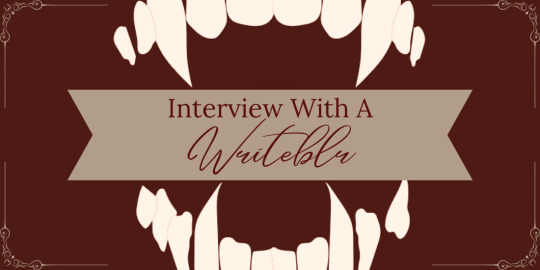
INTERVIEW WITH A WRITEBLR — @waysofink
Who You Are:
El || They/them
I'm a creative writing graduate from Poland. A slavic witch, a solarpunk & an overall creative & crafty goblin. I write fantasy, mystery and lately I've been dabbling in horror. Nowadays also an avid audio drama enthusiast!
What You Write:
What genres do you write in? What age ranges do you write for?
Fanfic, Fantasy, Horror, Mystery, Poetry, Sci-Fi. New Adult and Adult
What genre would you write in for the rest of your life, if you could? What about that genre appeals to you?
It's a split between fantasy and mystery. I feel like I like writing a story that is both. Can't live without dragons, but would also like to shroud the dragons in some mist, make them not so obvious in their dragon ways. Fantasy appeals to me so much because we can mold the aesthetics that acompany a setting we create and make them mean something, be a message, a metaphore, an echo of something from our world. I find that very cool. Mystery however sticks out to me, because secrets are enticing and I feel like many of us can relate to that feeling of "just wanting to KNOW". It's a good itch to adventure, following a lead of a mystery, it draws you right in and allows to explore puzzles of life.
What genre/s will you not write unless you HAVE to? What about that genre turns you off?
Romance. Simply because I am greyromantic and I honestly could not write a convincing plot that only revolves around a romantic relationship. I do write romance in my stories, don't get me wrong, but they are usually a subplot amongst the rest of the story.
Who is your target audience? Do you think anyone outside of that would get anything out of your works?
My fellow queer people, my fellow anarchist and socialist people, my fellow neurodivergent people, my fellow nerds. I don't think a straight white capitalist man who hates science and D&D would like my writing very much 😂
What kind of themes do you tend to focus on? What kinds of tropes? What about them appeals to you?
Recently I've been focusing on the theme of change. I can't say I have a library of themes I reach for, but I'm pretty sure that one has always been quite universal in my stories. When it comes to tropes I like a lot of the popular ones - grumpy/sunshine in relationships, magic as extension of the self and tool for self-discovery. I write a lot of ensambles, I recently notices. So I like the trope of a community fighting, learning and growing together. Kind if should have see that coming.
What themes or tropes can you not stand? What about them turn you off?
The Born Sexy Yesterday trope. Its the misogyny, your honour.
What are you currently working on? How long have you been working on it?
I'm currently writing an audio drama! Been working on it for maybe 2 months now? I just finished writing episode 1, I am quite proud of that :D
Why do you write? What keeps you writing?
It almost seems like I was born a storyteller and I have to write, because I have too many stories in my head. It might be the adhd tho, I don't know xD.
How long have you been writing? What do you think first drew you to it?
I've been writing since I was 12, but I was a storyteller well before that. My mom used to say I was making up characters as soon as I could talk. I know she wasn’t literal, but I'd like to think my first sentance was a story about a duck.
Where do you get your inspiration from? Is that how you got your inspiration for your current project? If not, where did the inspiration come from?
Inspiration is everywhere, but my main destillery of scene & story ideas is music. I'm sure many writers can relate to envisioning scenes or scenarios in their head while listening to a particularly brain-sceatching song. My current peoject is a combination of that and my discovery of a different medium through which i can tell stories - podcast. Blame Rusty Quill shows and many others for what I'm about to put out into the world. It's all their fault.
What work of yours are you most proud of? Why?
Ask me in a year, maybe my answer will be "this audio drama I wrote and produced!". For now, I am only proud of having many, many fun & cool ideas I haven't finished yet 😅
Have you published anything? Do you want to?
I haven't publish anything finished, not really. I hope to do it this time. 🤞
What part of the publishing process most appeals to you? What part least appeals to you?
The thrill of a finished project seems appealing, but I wouldn't know. The closest I got was publishing a fanfic on ao3. Getting kudos, getting positive feedback tho… that's quite a nice feeling. Least appealing would probably be marketing. I hate it, I don't know how to promote my stuff and that is probably why a lot of my projects end up unfinished - the lack of interest doesn't help the dopamine flow. And talking to people and promoting yourself is hard.
What part of the writing process most appeals to you? What part is least appealing?
Coming up with ideas, worldbuilding and shaping up the characters. That's the best. Worst would be the process of actually wrangling your ideas into a cohesive plot and putting them down on a page. A nightmare, truly a nightmare.
Do you have a writing process? Do you have an ideal setup? Do you write in pure chaos? Talk about your process a bit.
I work in spurts of energy, driven by dopamine, seratonin or spite. I'm a chaos incarnate and I am constantly ashamed of it, but I also love it and stand by my brain's ways. The vibes just gott be right. The music might help, or might not. Sometimes I just have to sit down and hype my story up to myself to write it - moodboards, playlists, all that jazz. And sometimes I simply sit down and hyperfixate on writing and voila - one chapter in a day.
Your Thoughts on Writeblr:
How long have you been a writeblr? What inspired you to join the community?
6 years it seems. I joined looking for likeminded folks, in search of stories and community. I did find a lot of good here, but I also learned how my brain can get really oversaturated with long posts and long conversations, so. I've been less active for the last 2 years for sure.
Shout out some of your favorite writeblrs. How did you find them and what made you want to follow them?
@drabbleitout is one of my favourite writers on here, I love their style & the way they write their androids. The wonderful @zonnemaagd (please verify that @, I am not sure if I spelled this right.) who enchants me with her words in her stories. @henrikedoeswritingsometimes had me at hello with their timeloop story. I freaking love time loop stories. More please.
What is your favorite part about writeblr?
Community? I only see positivity on here tbh. Though I have not wondered across the corners of the writeblr universe. So maybe its just that my little bubble is very cozy.
What do you think writeblr could improve on? How do you think we can go about doing so?
I tried to answer this question many times before - and I honestly don't know.
How do you contribute to the writeblr community? Do you think you could be doing more?
I don't contribute much these days. I wish I could do more. But life wants orherwise.
What kinds of posts do you most like to interact with?
silly posts, event posts, posts with writing references & snippets
What kind of posts do you most like to make?
I used to like sharing my writing snippets and wip intro posts, but soon there was too much pressure to publish more and more. and I just don't write things consistently enough to do that.
Finally, anywhere else online we may be able to find you?
@waysofink on all other socials (that mostly Twitter & tiktok these days)
4 notes
·
View notes
Note
Begging you, please, tell us more of your downton abbey thoughts. I want to hear about psychological horror abbey
Some VERY disjointed thoughts on psychological horror abbey:
- the plot of the story would very roughly be around downton as a classic Gothic Mansion, with all the suffocating psuedo-incestous family/work life that these stories entail
- Mary is the upper class aspect, Anna is the working class, and Tom is the person moving between the two worlds, acting mostly as a lower class man but able to force himself to act "civilized" when then family demands it
- All three of them are trapped in their positions; Mary as the eldest daughter can't leave the family or eschew marriage in any meaningful way, Anna obviously can't leave her class position as a servant and is considered "part of the family" by the crawlys and so can't leave them. Tom has a bit more freedom than them, as a man, but as an Irish national and a socialist he's severely limited by how much he's able to challenge the family's desires to keep him in the house with sybbie
- also as is typical in a gothic-adjacent horror: someone becoming "part of the family" (as happens to some of the servants, tom, etc) is less of an acceptance and much more of a smothering and a removal of what makes the person an individual
- In the new story I think it'd work best if all of the [borderline] sexual violence (mary & pamuk, anna & green, tom & edna, along with daisy & william (more on this below)) were narratively earlier-- maybe the new show starts in s4 and the mary&pamuk/daisy&william situations are flashbacks/implied?
- The Mary/Matthew romance is less of a "real" romance and more of a coerced marriage, drawn up between Matthew and Cora to keep the secret of Pamuk's rape of Mary/death within the family
- [john] bates' desire for revenge becomes less "noble man defending his wife" and more "completely average and normal man taking a violation of his wife's autonomy as a violation of his marriage and his exclusive right to her body." (Sidenote: I think this is what the show is actually doing and not noticing it. lol.)
- I honestly can't believe I left daisy out of the original post. I don't think she's exactly a victim of sexual violence, but I do think that being coerced into dating and then marrying william while he's on his deathbed must have done fascinating things to her mind. (I also think this aspect of her life is handled much better by the show as it is than Anna/Mary/Tom's subplots, but whatever.)
- I think in this au either a) William survives, and Daisy is forced into a loveless marriage and motherhood with him, technically able to divorce him but discouraged from doing so on all sides because "it would break his heart," or b) William dies, and Daisy is [either literally or psychologically] haunted by him for the rest of the show, convinced that she's damned to hell for lying to a man on his deathbed
- one thing that's present in the current show that I think could very quickly become horror is the relative isolation of the abbey. the whole crawly family runs the town but outside of the hospital scenes in the early eps and some fair scenes, we see incredibly little of the townspeople that the family rules over.
- I can picture the townsfolk fervently avoiding any discussion/news of the abbey, preferring to keep to themselves, which is noble when they're being lorded over by robert but not when Anna comes into town the day after her rape and none of the townsfolk will meet her eye
- I have very little idea of how the story would really end, but I WILL say I'm only like 50% joking with the posts about daisy burning down the house with everyone in it
6 notes
·
View notes
Text
I just realised that I can totally yap about my wip novel here so like. prepare for future infodumps.
this project is going to be a 1920s-inspired fantasy with a heavy focus on a sapphic romantic subplot based around visa fraud and lies, and the overarching plot is Very Political
currently has no title but I DO have the main character and her two besties (main supporting characters)
so our leading lady is Edith Peregrine Revanham of Crovalley. she is...from a wealthy background, as both first and second cousin of the queen (it's complicated). she is an advisor to the new queen and they're a couple of months apart in age. they grew up together! in her spare time, she enjoys reading about history, geography, and fiction (mostly romance).
next, we have Clara Valerie Crovalli, aka Edith's cousin and also the queen of Crovalley. she's the one who sends Edith on the mission (which I will probably elaborate on at some point). she is the older of the two. her father (before he died) was very briefly king, but he died during an outbreak of Vague Disease (probably tuberculosis or something), a few months after taking the throne. clara was pretty young at the time, and thus her uncle (Humphrey, who's a decent guy, more or less) became her regent. she's...gonna go through it. I mean, they all are, but you dont get to see Clara that much.
finally, we have Donna De Aliaty. she's from the neighbouring country of Doritane, and she and Edith get married for citizenship reasons, commiting visa fraud together. we love sapphics committing visa fraud together <3 anyway Donna is the more open about her Opinions, bc she grew up in the middle class. she is...basically a socialist. she works as a freelance writer, and also has a gig doing laundry for people. we love donna. we stan donna. she is queen (not literally)
but yeah those are our main three. we meet other characters but these three are the main trio. so like. if you have questions then drop and ask and i'll answer as best as I can!
and yes that includes asking what the plot is, I havent hammered out all the details but WE"RE GETTING THERE
#original fiction#fantasy writing#novel writing#fiction#wip#planning wip#worldbuilding?#sorta?#crovalley story#for the overall tag!#anyway yeah we love sapphics committing visa fraud together <3
1 note
·
View note
Text
I disagree with this reading but it isn't without merit. Wall-E is not the fact that mankind was provided for that resulted in the laziness, or should I say apathy, that the film is criticizing. It is the corporate nature of the comfort, the reduction of human existence to the consumption of products and interacting in entirely mediated circumstances. The Atlas is literally a privately owned space cruise ship. Saying that it is socialist is uhh. Wrong. This reading overlooks the entire subplot about two passengers on the ship who, entirely incidentally, find themselves interacting in unmediated circumstances and forming a much more genuine connection than anyone else on the ship.
The use of fat bodies as a visual metaphor for apathy is certainly dated, and definitely weakens the messaging of the film under a more inclusive lens of investigation, but you've got to get that the theme isn't about lazy people becoming not lazy. It's about a miniature society ruled over entirely by a corporation that controls every aspect of their lives who through the interference of a malfunctioning aspect of the system realize that they have never had any control of their lives, and they start making their own decisions.
Again like. This movie was released 2 years after idiocracy. It's a very basic criticism of the apathy that modern consumerist culture instills in people. People used fatphobia to comment on this in the 2000s. but you guys are projecting your legitimate grievances with broader society onto a film in a way that entirely denudes it of its actual message (which isnt even necessarily that strong) and I can't abide this. I wish yall the best.
it was kind of fucked up for wall-e to be that way about fat people now that im thinking about it
#sorry spooky you got tricked into reblogging a kind of bad take#so i wrote a manifesto#it will happen again
63K notes
·
View notes
Text
Not So Happy Newcrest Campers - SurvivorSims Challenge Episode 1 (Free Time 1 Red Team)
Welcome to the first episode of the SurvivorSims Challenge!
If you are interested in the challenge rules: See the pinned post on this blog.
How this works is that parts of the episode will be separated in posts: Free Time for both teams. The challenge. Free time for both teams again. The elimination.
So we’re starting off with introducing our teams and sims dynamics.
Red Team, you’re up first:

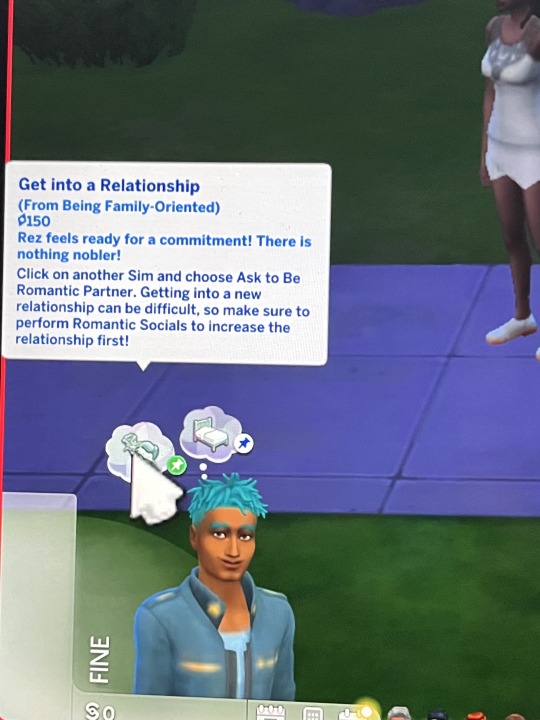
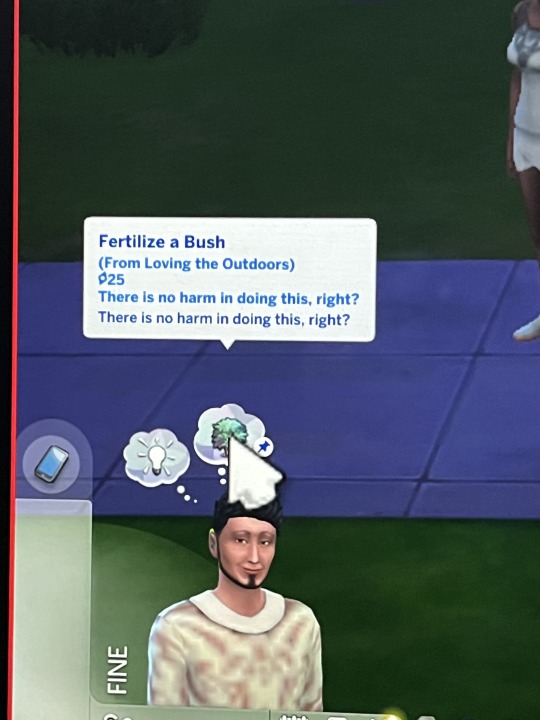

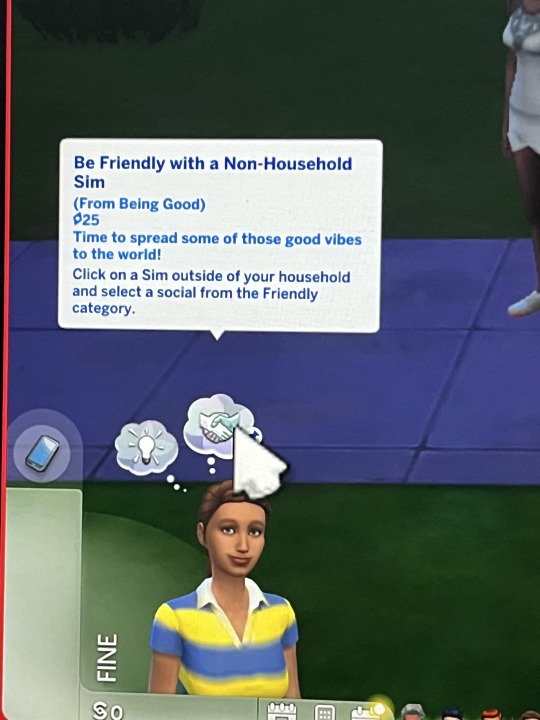
Right off the bat of coming in, we had sims already understanding the game and socializing.
What is funny is that Maribel and Eduardo specifically are mean. So they both already want to make enemies. Not sure how good that is for gameplay, but okay.
But they want to be friends with each other. So… villain duo??
Maribel wants to start beef with Christopher.
…and all Chris is doing is wondering how pissing in a busy works. “There is no harm in doing this, right?”
Rez, the guy with the teal hair, wants to start a romantic subplot already. He’s gonna be a playboy character I can tell.
Julianna seems to be the most asocial of this team. She wants to branch away from her team, and she’s the first to walk AWAY from the group to go to the fireplace.
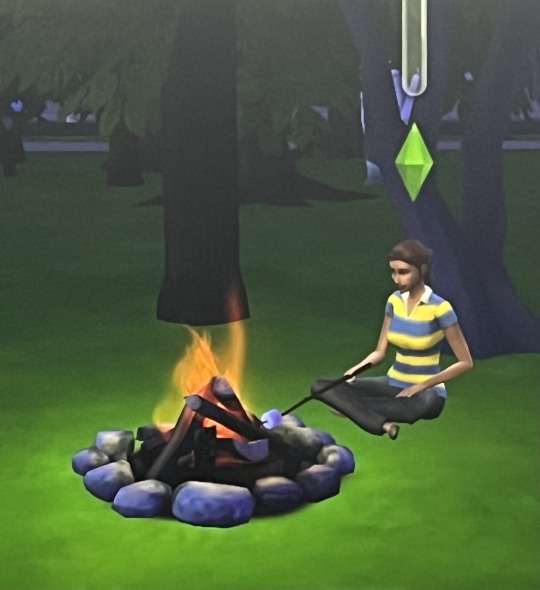
She JOGGED to roast those marshmallows.

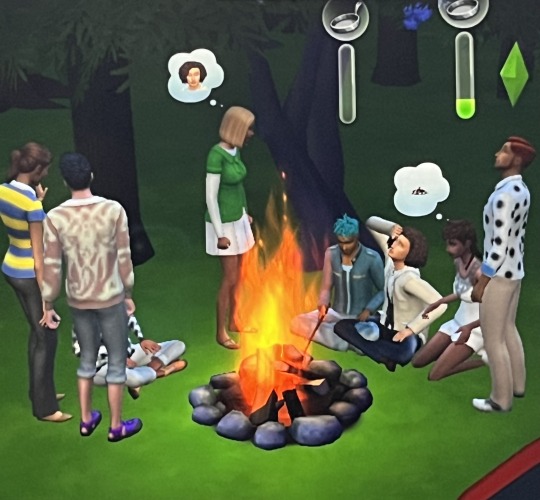
They all soon joined for this campfire session.
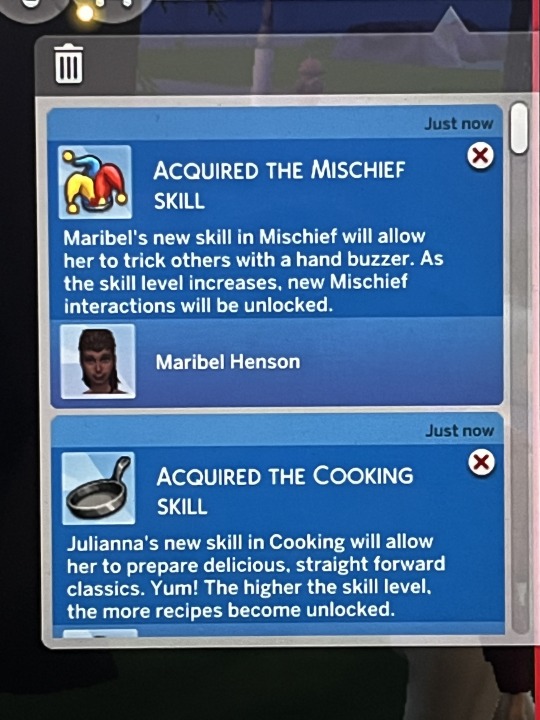
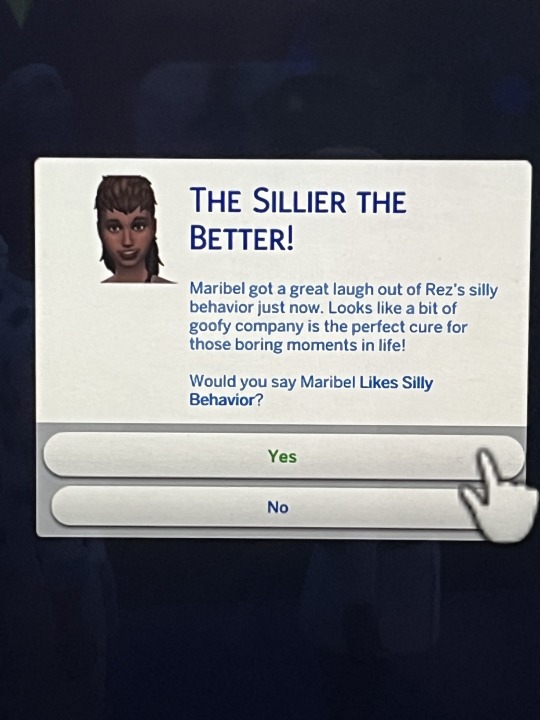
Maribel seems to be more of the silly mischievous type of mean character. She’s a prankster type.


She also likes singing campfire songs.
This is probably her way to get people to like her.
She’s probably gonna be one of my favorites of this team.

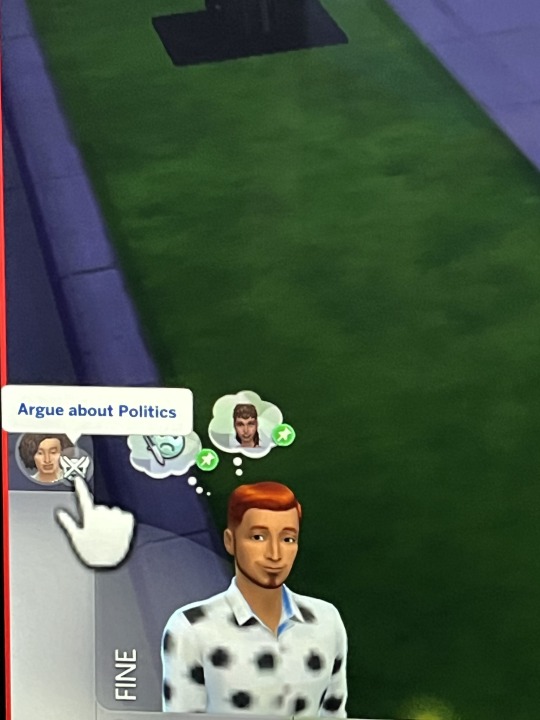
Eduardo is the opposite. He’s just a guy to stirs up beef just because.
Autonomously, he decided “I don’t know this Brenton guy on the team, BUT SCREW HIS POLITICS. HES MY ENEMY.”
And yeah, they don’t like each other.
Potential rivalry between Eduardo and Brenton here?
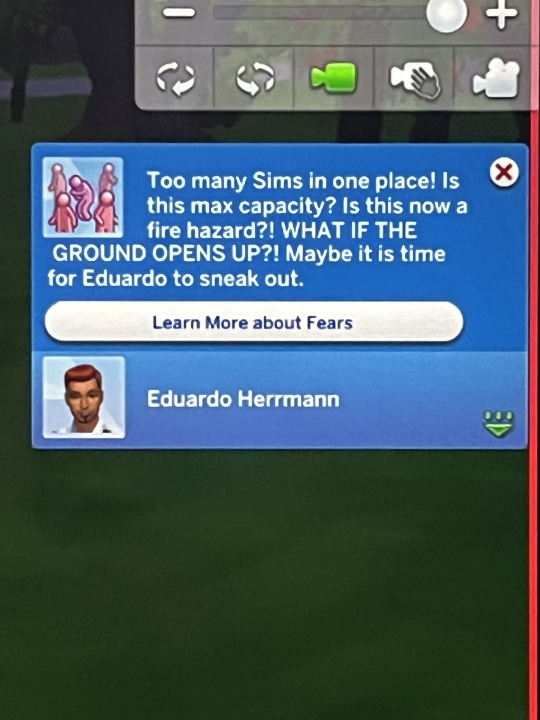
Eduardo also genuinely HATES THE PEOPLE HERE.
WHICH IS HYSTERICAL TO ME.
I think we found our villain character.
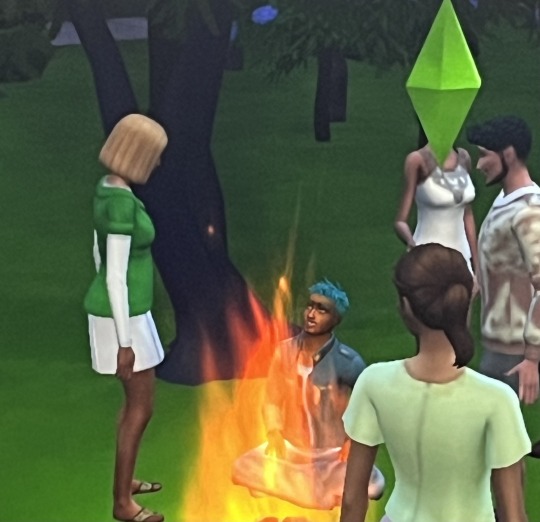
Going back to Rez wanting romance. I decided to just see who he talks to.
And his attention went to Alanna here.
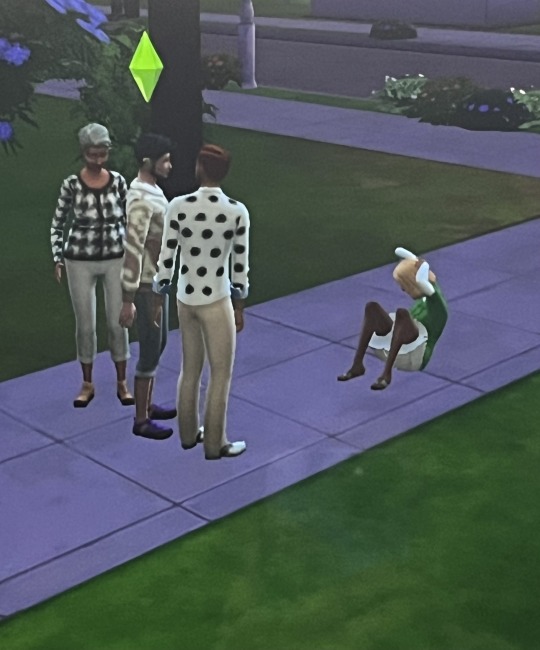
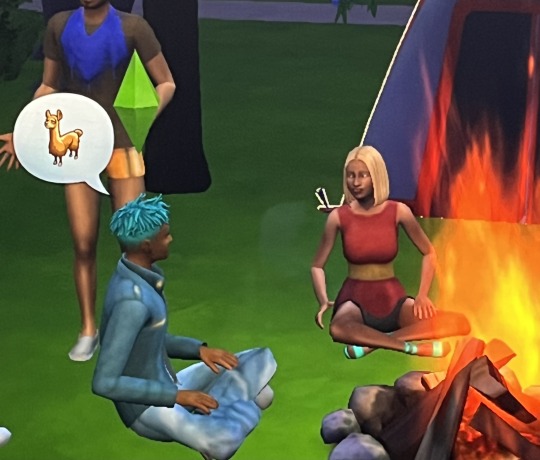
Alanna, off the bat, is the cheerful sporty character. The one everyone gets along with and wants around. This girl does not stay still.
And I guess Rez is attracted to her because they quickly got along and became friends.
Rez x Alanna showmance?
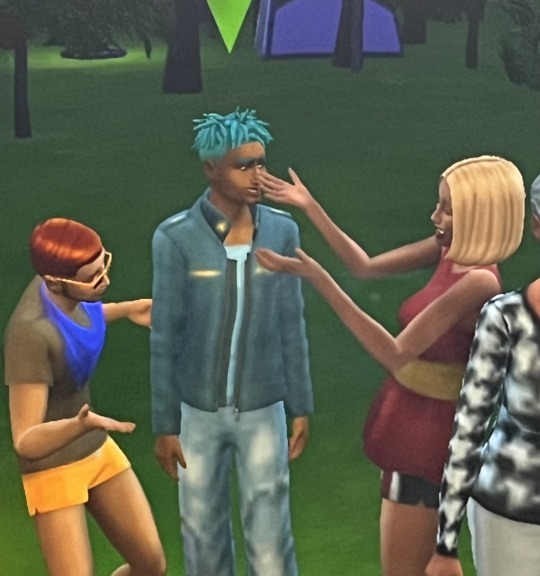
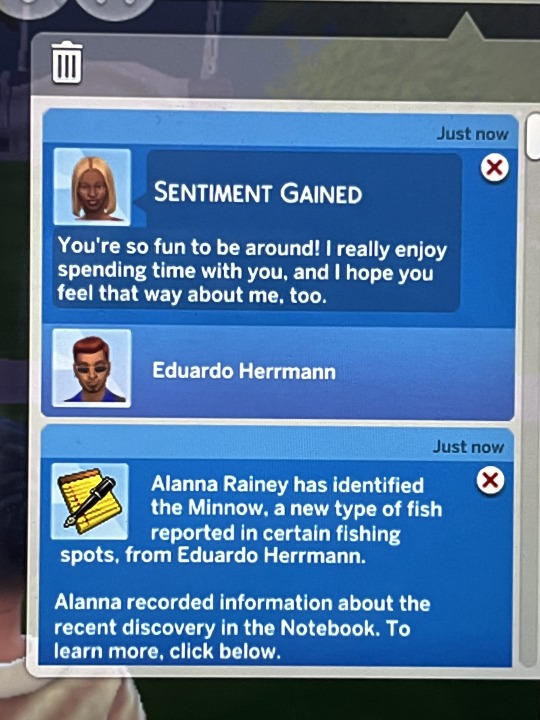
The problem? Eduardo ALSO takes advantage of people liking Alanna and gets on good terms with her. Even getting a positive sentiment out of her.
And we know Eduardo DOESNT actually care about her. I bet he just wants her vote.
Poor Rez has to compete with this guy for her affection.

Brenton meanwhile is the guy that’s been venturing around the camp. He’s an adventurous guy.
Good survivalist, but socialist??? Idk.
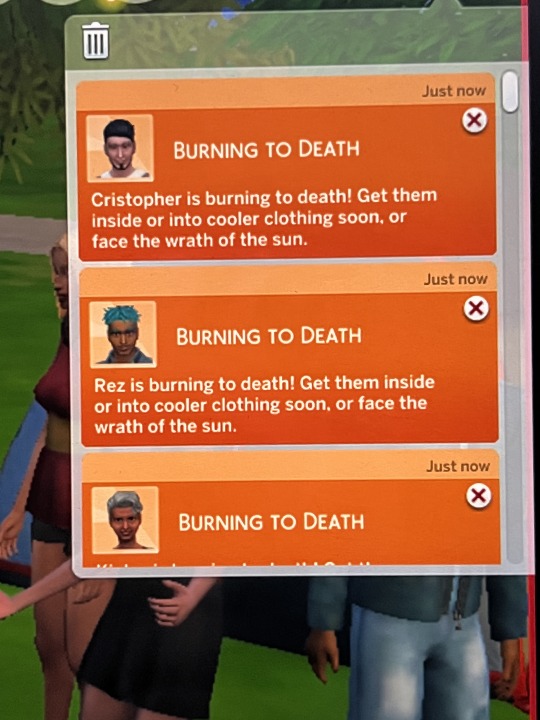
Smooth interesting first day. If I don’t kill anyone first. Nobody got any sleep.
(They’re all alive.)
#survivor#simblr#sims 4#sims community#survivorsims#the sims#the sims 4#the sims community#total drama#disventure camp
0 notes
Text
While Maher has never had an opinion worth having, I'm reminded of an anecdote by Warren Mitchell, actor of Alf Garnett from the British sitcom Till Death Do Us part upon which Archie Bunker and All in the Family are American adaptations.
Warren would say how he'd get people coming up to him praising Alf and saying they 100% agreed with the characters racist, anti-socialist views, only for the actor to angrily point out that the purpose of the character is to mock people exactly like them.
So the purpose of the character was that their hateful views were to make them the subject of mockery, only for people to like what Alf and Archie spouted regardless.
Not entirely surprising that Maher would count among the people who missed the joke with Bunker (again, he is tediously ignorant about many things), but I guess if you have to explain a joke to someone it fails as a joke, and if it's a joke that uses racism as an example for why racism is bad it fails even more so.
Like in that movie Tropic Thunder from ages back, were the subplot involving Robert Downey Jr's character in-universe dresses as an African American character within the movie they're shooting. The joke was meant to be about the racist extremes that studios would go to justify not casting people of colour in leading roles (or casting white people AS people of colour, such as the time when Linda Hunt won an Oscar for playing a Chinese-Australian man in the film the Year of Living Dangerously), with the in-universe studio attempting to justify it by claiming that RDJ's character has undergone a Christian Bale-ish physical transformation for the role, holding it up as a testament to the character's method acting (this turns out to be a lie, in the finale his character is shown to just be wearing make-up).
The only genuine person of colour in the in-universe movie's cast repeatedly points out how messed up it is that he had to settle for getting cast as a supporting character, when the dual-protagonist role ended up going to RDJ's character instead, with the ridiculous "no, he underwent surgery to be more accurate for the role, so it's fine" justification.
If your joke or subplot in a satiric story involves both a lengthy explanation AND knowledge of the context of racist casting in Hollywood understand what they're doing, most of the audience is going to have to assume it's just intended for shock value and is just being straight racist rather than mocking racist tropes.
28 notes
·
View notes
Text

Ch. 12: One Last Night Pt. II
This is it folks, I finished this fic! Summary: Businessman McMoneybanks Dorian Pavus meets LocalArtist Outdoorsyguy Taren Lavellan whilst on a business trip to a Fancy Ski Resort in the Mountains with his Terrible Father and learns the True Meaning of the Holidays (it’s love) (and anticapticalism)
Pairings: Pavellan, background Sera x Dagna
Rated M for non-explicit sex scenes and some other mature themes
Chapters: 12/12 (wc: 113 431)
From the top! Chapter snippet:
The morning was crisp, and achingly bright. A faint scent of woodsmoke filled the cold air, entering Taren’s lungs as he left his van parked in its spot behind his building and lifted his head to watch his breath float away. The block was silent. A thin layer of new snow lay untouched over the empty parking lot in the centre of it, and the street bore only the tracks of his own van, pressed into the still unplowed road until they turned in to come to rest behind him. His own building sat comfortably nestled next to neighbouring chocolatiers and bakeries and souvenir shops that dotted either side of the main road all the way down to the huge, ancient cedar that stood glittering with silver tinsel under the sun in the town square. The village grew out around it; zigzagging streets branched off towards familiar homes built into wide swaths of land hiding stoney hills and fields of scruffy grasses under the deep winter.
He took a long, wistful look back; eyes travelling up the mountain road and into the dense forests of snow-covered trees lining its path. Old, strong trees climbed the mountainsides: drooping yellow cedars and wide-armed alpine firs, jutting lodgepole pines and stumpy mountain hemlocks, mingling along the mountain’s clearings and thin rivers with sleeping birches and leafless golden aspens. Hidden in that depth was another road, a faint line of shadowy trail through the rocks and trees that turned away east and then south, winding off downward until it journeyed away from the mountains altogether. He sighed, a puff of cloudy breath thrust out grumpily into the air, and turned his gaze back towards the shop. He squinted against the flash of sunlight on silver as he tossed his keys into the air and caught them again out of habit alone, and then leaned back, staring up over the shuttered homes of his neighbours; over his home, too. The sky above him was a sharp and spotless azure blue, and smoke from nearby chimneys floated up into the windless sky in full, fluffy clouds of white.The rooftops of the still-sleeping shops and homes loomed quietly, covered in soft, thick pillows of pure white snow. It was beautiful and peaceful, like the whole world was dozing comfortably under some perfect spell, and Taren hated every single thing about it.
#its got a perfect hallmark movie ending and I love it#the end#twelve nights#my fic#my writing#modern au#dragon age fanfic#dorian pavus#taren lavellan#sera#dagna#the hallmark movie I deserve#subplots for socialists#30 days of dorian
15 notes
·
View notes
Photo
Wilhelm does subtlety about as well as August does integrity.
Great, important tags below about the fact that Wille is actually talking to Boris. Kristina insisting her son see a therapist was her best parenting decision ever. Even if it did boomerang back on her in 2.06.
And Wilhelm recognizing his own anxiety symptoms enough to sneak the pamphlet. Desperately sad that he dare not take the pamphlet openly, but at least he takes it.
With Boris being a mental health professional who doesn’t report to his mother and is much more concerned with Wille as his patient than with the minor detail that Wille is also Crown Prince Wilhelm of Sweden. And I don’t think it’s an accident that in S1 August refers to Boris as a socialist, and in S2, Nils does as well.
Boris’s left wing views suggest someone who may not be actively anti-monarchy, but is not hung up on the glory of the monarchy either. And that is the exact reason he is the perfect therapist for Wille. Because every other fucking adult in his life treats him as Crown Prince Wilhelm. Boris just treats him like a teenager with a recent bereavement, recent sexual trauma, recent messy breakup from his first serious relationship, and ferociously conformist, demanding parents.
Tags from @yourhighnesssblog

More tags from @justanotherhyperfixation

Yet more tags from @nooelgallagher
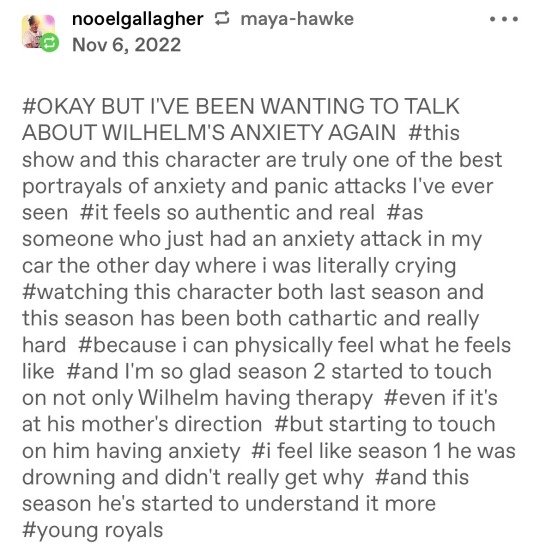
And finally, light hearted tags from @whaticameherefor and a reminder from @efkaservicegirl that actually, it was Kristina of all people who set in motion this subplot whereby Wilhelm can talk to Boris. And “sneakily” grab a pamphlet on anxiety from Boris’s office.
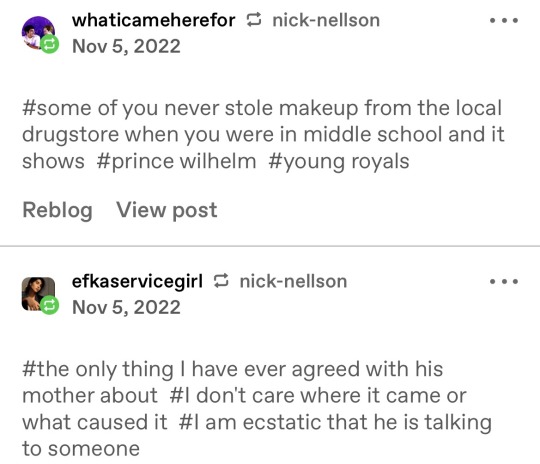



#real subtle there wille
1K notes
·
View notes
Photo
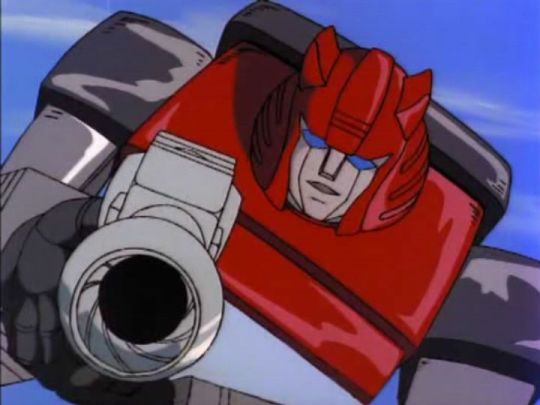

Top 40 Radio DJ and voice of the original Shaggy, Casey Kasem, was the voice of Cliffjumper, aka, the “Red Bumblebee,” in the original Transformers animated series. He also provided the voice of the computer, TELTRAAN-1.


Casey Kasem is of Arabian origin, and left the Transformers series when a third season episode featured a Socialist Democratic Federated Republic of Carbombya, led by an evil and tyrannical general Abdul Fakkadi. He found this choice of subplot to be in poor taste and insulting to his culture. Kasem asked for a change in the script, and when the writers refused, he left the series.
251 notes
·
View notes
Note
Ugh, here's Dextixer's newest bullshit spouting thread, trying to accuse the CRWBY of being anti-union and racist. ...I'm so done with this fucker getting to post this hateful shit and the mods turning a blind eye to it.
www(.)reddit(.)com/r/RWBY/comments/yy1jpp/crwby_and_antiunion_political_messages_in_rwby/
Oh come on, it can't be that bad?
RT and RWBY itself are no strangers to political content and discussions surrounding it. The series started with a stand-in for minorities in the form of Faunus. It started with a racial discrimination subplot. A subplot that was heavily mishandled and eventually, for the most part, abandoned after Volume 5. The writers themselves admited that they were ignorant on the subject. And yet... And yet they cannot seem to keep away from once again diving into political topics, again and again.
Oh for god's sake.
The Fanaus are not political. In order for something to be political, it would have to be talking recent events rather than universal issues. Bigotry is nothing new.
Also, know how people bitch about the Fanaus plotline because the WF was portrayed as bad even though civil rights groups can be bad because they're still made up of people and were still in-fact BETTER than their human counterparts? Those details that break any accusation of racism because it still treats the Fanaus better than the humans? Well-
During the story of RWBY: Arowfell our protagonists discover orbs that seem to attract Grimm to them. Eventually they find out that the person behind those orbs is no other than Hanlon Firestone, an ex-soldier of Atlas who became a very known and popular Union leader in Mantle, at least in the Arowfell universe.
It is discovered that he has a semblance with which he can extract raw fear out of people, which is then used to power special orbs that can contain fear. The protagonists then find him in Mantle, extracting fear from a young faunus woman by threathening to take out her eyes.
After some combat sequences he yelds, makes a short speech about how "This is not what i wanted" and reveals about his past efforts in trying to keep peace between Atlas and Mantle, and is then taken away by Atlas soldiers. While being taken away he also stated that "Whatever happens next is entirely your fault" while activating a Remote.
It is quickly found that this remote activated 4 separate Grimm attracting Orbs. Their activation not only results in increased Grimm activity but also results in the destruction of at least one village.
Hnalon isn't the main bad guy of RWBY Arrowfell.
That's Bram Thronmane. An ATLAS elite. Who caused this mass destruction as a means of petty revenge.
So not only is the union leader not the main bad guy, undercutting the whole 'unions are EVIL!' narrative he's pushing due to how fast he's swept away, but he's actually more MORAL than Bram. At the very least, he wanted to try and make things better. Bram was just being petty.
Sound familiar?
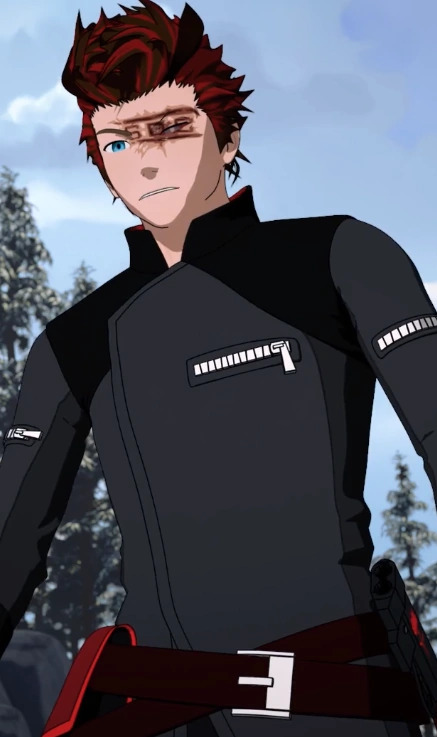

But hey, it's not like Dextixer is politically biased or anything that would cause him to treat this as a personal attack or anything. I'm sure this is an honest mistak-
Sincerely, an European Democratic Socialist.
... So let me get this straight.
You, a socialist. You, someone who preaches an ideology that nominally supports union leaders is preaching about how the poor union leader is bad while the elite is portrayed as bad or worse.
You know, I was operating under the idea that you made a rash decision and made a post before having all the facts. Bad but not the worst. But now, I have to question if you're being willfully ignorant to push your own politics. Just like the people who bitch about the WF.
Union leaders and workers have been long villainized in Media of all stripes, especially American media. They are often portrayed in three main ways, obsolete remnants of the past, corrupt thieves or completely unrealistic and uneeded.
In the case of Unrealistic and uneeded - It involves glorification of bosses and managers, or the glorification of the "bootstrap" mentality, of workers managing to rise up on their own merit.
The same is with their portrayal of being remnants of the past, although that usually takes a bit more positive spin on the past. It tells the viewer that "Bosses were bad in the past, and unions were good" and then proceeds to sell the myth that "Everything is fine now".
The portrayal of unions as being corrupt organizations full of thevies is a long standing one at this point. Often union leaders are either shown like "mob bosses" or are shown to pretend to be nice to the public while stealing money under the table.
Animation, Gaming and Movie industries have LONG been resistant to Unions despite the many reports of underpayment, workplace abuses and a long list of other issues.
You know, this might have...meant something if not for:
A. You providing no examples while all my time as a natural born AMERICAN lead to me growing up thinking unions were good.
B. You admitting to being a Socialist. You have ideological reason to misconstrue things. We can even tell by that little "It tells the viewer that "Bosses were bad in the past, and unions were good" and then proceeds to sell the myth that "Everything is fine now"" comment.
This isn't a villainization- It's actually a praising of unions as they improved conditions. It's only a villainization to you because your ideology says 'anything that gets in the way of smashing capitalism is evil!'
I do not think i need to rehash the RT drama of what happened nearly a month ago at this point. The stories of RT treatment of its workers are well known at this point. Sexual abuses, underpayment, overworking, these are well known and recorded. I have heard some talks of unionizing, but that has not manifested into anything just yet.
And yet here we are. Here we are with an Union leader who seems to be treated as a hero in Mantle. And he is evil. EVERYTHING about his portrayal screams, pure unadalturated evil, there are many intentional decisions taken to portray him like that.
So, if he really is pure evil, he surely can't be better than Bram then, right?
A) The first scene we see him in he is threathening and draining the fear of a young faunus girl. While doing so he looks smug, smiling, enjoying himself. After finishing the drain he just throws her away, like a rag to be discarded.
Counter: Bram using Olive and Team BRIR as pawns and lying to them for his petty revenge.
B) If that was not enough, i have to point out the very uncomfortable implications of him being portrayed as a large burly person of colour in a position of power and hurting a woman. There is a reason why he is not shown to be manhandling a man.
Counter: Did I mention Olive is black and a member of Team BRIR is as well? Also, this might have to do with the fact that people don't care if a dude would get hurt.
C) We are also heavily hinted at the fact that he hunts down specifically Faunus. An encounter with a faunus girl before his encounter reveals that faunus have been dissapearing in Mantle. Hanlon is a human, an union boss of the majority race is shown to secretly be abusing minorities.
Counter: Bram doesn't even have that. His actions would have destabilized all of Atlas all because James didn't hire him to his dream position.
D) During his fight his voice acting is specifically geared to be a villains. When he makes some of his attacks he laughs in a stereotypically villainy way. During the non-voiced talks between him and team RWBY he GROWLS and he starts his fight by saying "Let me show you what real fear is".
Counter: Bram too, just a pettier, more pathetic version.
E) After the fight is over and he is beaten. Instead of being humbled and surrendering peacefully, he activates 4 extra Grimm attracting Orbs to cause more destruction and puts the blame on team RWBY
Counter: Bram tried to have BRIR KILL them.
Let us be very clear. The ENTIRETY of the game when you meet him, makes him out to be a villain.
I think i have to be fair to mention that after he is beaten, he says that "This is not what i wanted" "I had no choice", but these two lines COMPLETELY do not match the rest of his character in any way shape or form. These phrases seem especially hollow since it is after saying those phrases that he activates the 4 grimm attracting orbs to cause even more destruction.
Really now? Cutting some context there.
Here's what he said in full- (6:48)
youtube
Sound familar? It's the basic essence of socialism. No wonder he takes it so personally huh?
Did I also forget to mention that you fight an Atlesian big shot's giant mech, before which he blusters but then runs away like a pathetic bitch?
Yeah, the whole narrative is just collapsing at this point.
Hanlon shows no positive traits, no signs of being forced, no signs of him not wanting to do what he was doing. As i pointed out above, all signs point into him ENJOYING his actions and he is portrayed as a villain.
He was once a hero and was trying to make things better. More than can be said for Bram, who's just a hairy Jacques.
Him being a person of colour in a show that seems to have next to no protagonists that are people of colour and instead seemingly relegades characters of darker skin tones to villain/antagonist roles is just a cherry on top.
The main bad guy is WHITE.
There is also no excuse that can be made for "He was forced" argument because team RWBY after that fight soon gets betrayed by someone they thought to be an ally. Olive Harper.
Olive Harper betrays team RWBY and tries to get them killed after the 4 orbs get dealt with. When team RWBY finally reach Olive. There is no fight. They reach Olive while she is crying, not only is she crying but she also gives an entire story of how she was foolled into betrayal by believing that the main villain of the game would make live better for those who live in Mantle/Atlas.
Not only does she do that but after team RWBY talks to her, she gives them 4 skill points to make them better in battle and to stop the main villain.
Does anyone else note the difference between how Olive Harper, a traitor that tried to kill team RWBY is portrayed in her redemption. And the difference in how Hanlon is portrayed? There is not even a comparison to be made here...
Notice how A. He doesn't mention what Olive's skin color is (since that would kill his race baiting bullshit) and B. He doesn't mention what the main villain's name is (which would destroy his narrative).
You don't 'accidentally' do this. He's withholding facts to manipulate people's view.
As with any arguments made, i can already foresee some of the excuses already being made as to why RT is not at fault for how Hanlon is writen about how they are still an "Amazing progressive company".
As for the arguments of 'You're a fucking socialist, you have every reason to lie to play the victim' and 'You completely ignore the final boss, who is basically Hanlon but worse, an elite and white'?
Nothing? Funny that.
D) And please, let us there be no excuses of "Well, RT didnt know, it was Way-Forward fault", this excuse has already been used way too much. When Blake slapped Sun it was the fault of animators, when people perceived Clover and Qrow being somewhat flirty it was animators, and in the case of Ice-Queendom all blame was laid before the feet of Shaft. RT intended for this portrayal.
The animators admitted it. BOTH times.
And Shaft outright SAID they wrote the story.
But nice little fallacy there.
I dont think i can say anything more on this topic than what i have already stated. RWBY has always been bad with covering political issues, and i had hoped that they learned their lessons, but that does not seem to be the case.
You know, every single time I have seen someone say this, I have replaced it with 'Either preach my ideology or I will do everything I can to misrepresent you.'
It's never once failed me.
22 notes
·
View notes
Text
Thoughts on Tolkien
I have a complex relationship to the works of J.R.R. Tolkien. Like many readers, The Hobbit and The Lord of the Rings was my introduction to fantasy, and it enabled me to see right through the many inferior imitators of LOTR and recognize them as such. And I greatly admired Tolkien. As I grew older, I became more aware of other fantasy authors, both those who pre-dated Tolkien’s works and those who came after. And I also became aware of the history of fantasy fiction (which did not start with Tolkien) and the criticism of Tolkien, made by authors like Michael Moorock and China Mieville.
My thoughts on Tolkien and his place within the fantasy genre now are so ambiguous and complex that I feel the need to write this long post, which is admittedly not very coherent and rambling, but I have so much to say that it feels like it can’t be neatly ordered. More under the cut.
Part 1: Tolkien’s themes and his value as an author
One of the major criticisms of Tolkien is Michael Moorcock’s essay Epic Pooh. And It’s flawed, his criticism of Tolkien is overstated and he clearly misreads LOTR (missing out on the novel’s tragic aspects), Mieville’s essay is more even-handed and better. Yet the charge both Moorcock and Mieville make, of Tolkien’s works being reactionary, is undoubtedly true. Tolkien was a catholic conservative and it clearly shows in his works.
It’s the kind of truly reactionary politics that was against industrial capitalism and longed for a romanticized medieval world prior to both the French revolution and the Industrial revolution. It was the original kind of political conservatism, a reaction to the French revolution, and representing the interest of the old aristocracy, in opposition to the rising capitalist class. But the reactionaries soon found that it was impossible to return to a pre-1789 world. The failure of the Bourbon restoration to reverse the revolution, despite the considerable influence of the reactionary ultra-royalists is a case in point. Conservative politicians instead realized during the 18th century that the only viable conservative project was conserving capitalism from the threat of the rising socialist movement.
Instead this reactionary thinking found its most lasting expression in literature. The romantic movement was in many ways a reaction to industrial capitalism. The romantics noticed how nature was destroyed to make way for ugly industry. And they started to literally romanticize the pre-industrial medieval period in their works in response. It was a kind of emotional response to the uglyness of capitalism and its destruction of nature. It wasn’t entirely right-wing in nature, William Morris is a good example, but it was easily compatible with the reactionary politics.
Tolkien is essentially a neo-romantic writer who continues that tradition. Middle-Earth is an invented world that idealizes the medieval world, including its social systems. In Middle-Earth monarchy works and both The Hobbit and LOTR has a return of the rightful king subplot. And it’s a very pastoral and anti-industrial fantasy. Both Sauron and especially Saruman represent the industrial revolution and destroy the beauty of nature with their unnatural works.
Tolkien has been criticized for his essentialism and manichean morality. The charge of manicheanism is partly true. His worldbuilding has a very clear divide between good and evil, Eru Iluvatar is good, Morgoth is evil. It reveals Tolkien’s catholicism pretty well, they’re basically God and Satan.
However he also has another trait of catholicism: belief in the fall of man and original sin. People who are not God are easily corrupted, especially by power. That’s the point of the Ring. It promises the owner mastery of the world and you will turn evil if you give in to that temptation. Even Gandalf and Galadriel would be corrupted if given the Ring, and if they remain good and pure it’s only because they recognize that and don’t try to get hold of the Ring. Good people can still have power, Aragorn gaining power as king is good, but it’s far more limited than what the ring promises.
This is what gives Tolkien’s character’s complexity, it is that they are all fallible and in LOTR, particularly to being corrupted by power. The Silmarillion shows that even the elves are fully capable of several of the seven sins.
And Tolkien was aware you could not turn back the clock to any prelapsarian utopia. In fact, as a good catholic he believed life on Earth was inevitably flawed, the “vale of tears” and was in decline. Salvation could only come from God and the afterlife. Thus Middle-Earth, while having aspects of a pastoral and magical utopia, is a land in a decline from that ideal. LOTR is about how magic and elves are leaving Middle-Earth, making way for the age of man. In fact, Middle-Earth is not a world separate from our world, but an imagined past for it. The war of the ring is necessary to prevent a great catastrophe, ut it can’t prevent the inevitable decline. if Sauron and Saruman represent the industrial revolution and are defeated, it will still happen eventually.
Tolkien had an ambivalence about violence and war. He is sometimes criticized for glorifying violence, and again there is some truth to the accusation, yet the truth is more nuanced. War is justified in Lord of the Rings, the enemies are the evil orcs and killing them holds back Sauron from wreaking utter catastrophe with his rule of Middle-Earth. Yet there is still a sense of the horror of war, informed by Tolkien’s own experiences in World War I. Faramir’s short speech about not loving the bright sword or the glory of the warrior, but “only that which they defend” about sums it up. There are moving depictions of the dead bodies left behind after a battle, while that battle is still justified in the text.
There is similarly an emphasis on the concept of Christian pity and mercy. Gollum is malevolent to both of them, but both Bilbo in The Hobbit and Frodo in The Lord of the Rings take pity on Gollum and spare him. Gandalf makes it explicitthat the message is that you should show mercy and not kill everyone you think deserve death, and that unexpected good will come out of it. When Gollum’s actions at the end of LOTR lead to the destruction of the Ring, through an act of God, he is proven completely right.
Tolkien’s view on women similarly deserves some nuance in discussion. There is little outright misogyny, but there is a lack of female characters. There are none in The Hobbit. And women are present in LOTR and The Silmarillion, but play a minor part compared to the male characters. Still, Tolkien’s women do have power. Eowyn is probably the most interesting, as she gets to perform the roles otherwise reserved for male characters. She fight in war as a “shieldmaiden” (a term from Norse myth) and defeats the Witch-king of Angmar. Even her gender is relevant in this struggle, as the witch-king proclaims that no man may stop him, but Eowyn is still able to defeat him because she is woman. She later abandons war as a shieldmaiden and becomes a healer. It’s something that might sound bad out of context, but in the context of the portrayal of war reflects Tolkien’s awareness of the horrors of war, rather than his sexism. It’s not that she is unfit for battle because of her gender, instead Eowyn has become wise about the horrors of war after experiencing it and wishes not to glorify it any longer.
The charge of racism and essentialism has more weight to it. The essentialism part is undoubtedly true, every race such as elves, dwarves and hobbits has a determined character due to their race, including psychological traits. His orcs are an inherently evil race, despite clearly being sentient. They are the main means of justifying the warfare of the heroes, as their evil nature means they are not able to be pitied.
This troubled even Tolkien late in life, who as a catholic, of course believed in free will and that doing good or evil was a choice. So if the orcs are sentient, and thus have free will, yet are all evil due to their race, there is an obvious contradiction there. This was private worldbuilding thoughts that isn’t really expressed in the finished works by him that we have, yet they do illustrate how problematic the orcs are as a concept, even from his catholic conservative perspective.
The orcs are racist, even if they were not intended to be a caricature of non-white people as evil. Tolkien grew up and lived during the height of the British Empire, and it’s inevitable that he absorbed much of its ideology. So inventing an inherently evil and barbaric dark-skinned race is not an innocent choice, however unintentional it is.
Yet you don’t have to look to the orcs to see signs of racism in Tolkien. The Haradrim, who are dark-skinned men from the south who serve Sauron, are enough. Unlike orcs they are not inherently evil and are given some sympathy, but they still are uncomfortably racist.
So that’s what Tolkien’s works are about, their themes. How are Tolkien’s books as reading? And I think they’re good. The Hobbit is a fine children’s adventure novel, even if it’s very boy’s own adventure (as in boy’s only adventure). The Lord of the Rings is a fine epic adventure novel, if overlong as the kind of victorian adventure novel Tolkien was inspired by tended to be. The pacing is often slow as the book is overburdened a bit with worldbuilding and scene descriptions, but it’s not too bad.
The Silmarillion had to heavy edited and actually partly written by Christopher Tolkien after John Ronald Reuel’s death, but it maybe expresses J.R.R. Tolkien’s goal of creating a fictional mythology best. There are fewer concessions to the modern form of the novel, the storytelling is more mythical and epic. It feels appropriate for Tolkien’s goals and works rather well.
They are maybe not literary masterpieces in terms of character complexity or the beauty of the prose, they are readable, enjoyable and emotionally complex enough to be often moving. Tolkien’s catholicism and conservatism is always apparent, and I don’t agree with it, but it’s expressed with imagination and consistency.
Of course Tolkien was very much a worldbuilder, in the sense of creating a consistent secondary fantasy world with its own history and languages. It’s probably his most original trait, writers had created secondary worlds before him, both dreamlike ones like Oz or more grounded worlds like those of William Morris, but they were not as elaborate as Tolkien’s Middle-Earth.
Tolkien’s world has been much imitated, but these imitations are seldom as convincing. Tolkien was a philologist with a truly impressive knowledge of language and mythology. His languages are actual constructed languages, with grammar and a vocabulary. They are not fully usable, but there is enough substance for them to be convincing and it lends a strong verisimilitude to his worlds. Their names actually mean things, and are connected to the languages in interesting ways.
Part 2: Adaptations
When it comes to adaptations. I have to agree with the general consensus that the Peter Jackson movies of LOTR are fine, while the Hobbit movies by the same director are pretty bad. The Hobbit movies are overburdened with unnecessary changes and additions in a vain attempt to make it into a three movie epic to rival LOTR, not recognizing it’s a simple children’s adventure novel. Even Jackson’s LOTR movies are a bit glib in how they handle violence and war, there is too much Hollywood-style action to make war seem cool.
The 1977 The Hobbit film by Rankin-Bassis perhaps too short, as it tries to squeeze the story into a 90 minute film. But visually it has some interesting designs, including good background art. The film’s modesty and earnest attempt to be a story for children is charming and refreshing after experiencing the Jackson films.
The best adaptation in my opinion is the 1981 BBC radio drama, which is just excellent. The quality of the acting is of the highest quality, featuring many of the greatest British actors of the time, including Ian Holm as Frodo, Bill Nighy as Sam, Robert Stephens as Aragorn and Michael Hordern as Gandalf. Stephens as Aragorn and Peter Woodthorpe as Gollum are the definitive portrayals in my mind. The dramatization is a skillful adaptation that despite some necessary abridgements stays remarkably true to the book. It even includes many of the poems and songs.
Part 3: The history of fantasy
Of course Tolkien is overrated in the sense that he is often viewed as the creator of fantasy. Even some of his critics tend to see him as some originator of the fantasy genre and condemn the genre accordingly. And that is just not true. Fantasy fiction, in the sense of modern fiction that uses supernatural elements inspired by myth and fairy tales and folklore, dates to the romantic movement.
The stories of E.T.A. Hoffmann and Friedrich De La Motte Foque’s Undine are early 19th century German examples. The gothic and supernatural horror in general has strong overlap with fantasy, and William Beckford’s Vathek is a classic gothic novel with elements of what we now call fantasy fiction. There is also non-supernatural fiction that influenced fantasy. There is noting explicitly supernatural about Walter Scott’s Ivanhoe but it’s tale of adventure in a romanticized middle-ages has much to do with Tolkien and much of fantasy fiction.
During the Victorian era this tradition was continued by writers such as George Macdonald with novels like Phantastesand later in the century by William Morris. Morris preceded Tolkien by portraying a grounded medievalistic secondary world instead of the dreamlands a lot of other fantasy time tended to portray. He also wrote better and more varied women characters than Tolkien. By the Edwardian era, the major fantasy writer in English was Lord Dunsany. In fact there is not much in Tolkien that you can’t trace back to Morris and Dunsany.
And of course there is a wealth of children’s fiction preceding Tolkien’s The Hobbit, much of which is still well-known today. Lewis Carroll’s Alice in Wonderland, J.M. Barrie’s Peter Pan, and L. Frank Baum’s Oz books are still popular.
Tolkien was not even the only one continuing the tradition romantic and Victorian era fantasy in his time. Dunsany was broadly his contemporary, and you have other writers like T.H. White with The Once and Future King, E.R. Eddison and Hope Mirrlees. And during Tolkien’s era, fantasy flourished in pulp fiction. Robert E. Howard is the most famous, but Lovecraft wrote some fine Dunsany-inspired fantasy with his Dreamlands tales. And there are other lesser know fantasy pulp writers like Clark Ashton Smith, A. Merritt and Fletcher Pratt and L. Sprague De Camp.
If I resent Tolkien’s popularity, it’s because the sheer extent of it has overshadowed the wealth and diversity of fantasy that preceded him. This is why I felt the need to write this abridged history of fantasy fiction in what is ostensibly a Tolkien review, he should be put into context far more often than he is.
He merely popularized the genre. It was no accident that he did. Writers like Morris, Eddison and Dunsany were consciously archaic in their prose. Tolkien has some archaicisms, but his language is far simpler and more modern. The fantasy writers who inspired Tolkien may have written better prose than Tolkien, but it was much less accessible and harder to imitate.
Part 4: Tolkien’s influence on fantasy
Of course Tolkien proved hard to imitate too. The modern fantasy genre is in large part built upon an imitation of Tolkien, and those novels are usually the least interesting ones. There is a lot of what Ursula Le Guin called commodified fantasy that imitates Tolkien.
It started with Terry Brooks’s The Sword of Shannara, a book that copied the plot and characters of LOTR so deeply that writer and editor Lin Carter aptly called it "the single most cold-blooded, complete rip-off of another book that I have ever read”. But Shannara was a great sales success, one which proved that you could shamelessly imitate LOTR and become a bestseller. This led publishers to publish a lot of heavily Tolkien-inspired commercial fantasy.
These imitations simplified Tolkien, often developing his faults as a writer to extreme degrees without any of his virtues. The idealization of monarchy, the essentialistic portrayal of the races like elves and dwarves, the lack of leading women characters, all were copied without thought into this imitation-Tolkien genre. If Tolkien’s romanticization of a pre-industrial past was part of a consistent reactionary Catholic worldview, the books of his imitators do it mainly just because Tolkien did it and Tolkien sold a lot of books.
LOTR could be rightfully accused of being overlong, but it’s nothing compared to how his imitators write. The general idea seems to be that since LOTR is a long book (which depending on edition) is over one thousand-pages long and it’s good, what if we write a long series of books that are all about 1000 pages, that must be even better, right?
Tolkien’s worldbuilding was always an escapist endeavour, but modern fantasy writing seems to be entirely motivated to provide easy escapism into a secondary fictional world. The quality of the storytelling or writing doesn’t seem to matter, commercial fantasy books just seem to exist to provide a secondary world to escape into from the troubles of the real one. It doesn’t matter that the plot barely advances from long book to long book, as long as the reader gets to stay in this comforting world. And these imitation-Tolkien worlds are far inferior to his, since they lack the linguistic and mythological knowledge that Tolkien had. Their names and words are often just random letters strung together, instead of the carefully constructed languages Tolkien made.
Of course in the last 20 years or so, the most direct form of Tolkien-imitators in fantasy have mostly died out, except in YA and children’s fiction, where it still thrives. Harry Potter still relies on the plot of defeating a dark lord taken from Tolkien. In fantasy marketed to “adults” it has been replaced by a George R.R. Martin inspired grimdark genre of fantasy which isn’t much of an improvement. The books still further straight white male perspective of Tolkien and his imitators, and are still derivative of his medieval-flavored world. They just have a lot more pointless violence, sometimes sexual against women.
The naked commercialism of such commodified fantasy fiction is also contrary to how Tolkien wrote. Tolkien’s novels, especially LOTR, have been massive sales successes, but he could not have predicted that in the least. Bestsellers in the 1940s and 50s were not remotely like LOTR, and while part of an existing fantasy genre, it was not a massively commercially successful one. It was clearly a labour of love for Tolkien, made for its own sake, rather than any hope of money.
So I definitely think the exalted position of LOTR in western culture is not a good thing. It’s massive success has overshadowed the wealth and diversity of fantasy fiction, both works previous and contemporary to Tolkien and in the present day by becoming the model for commodified fantasy to this day. And Tolkien work has reactionary themes that is often perpetuated by the works imitating it. You can’t really think about LOTR and Tolkien today without acknowledging that.
Yet Tolkien’s fiction is hard for me to completely condemn. They are despite their flaws entertaining and interesting fiction. And Tolkien clearly did not intend for them to become the commercial behemoths they became. He is not to blame for the effect his work had on others.
8 notes
·
View notes
Photo
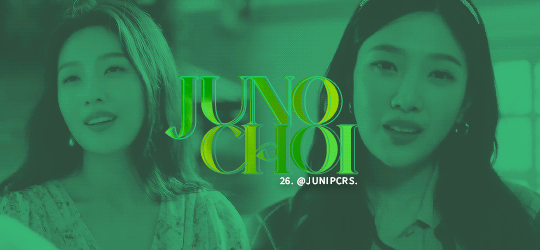

park sooyoung. she/her. cis woman. › spotted at the met steps , JUNIPER “JUNO” CHOI , most likely listening to killer queen by queen with their airpods pro . the twenty-six year old gained quite a reputation , known to be -outspoken yet +perceptive to anyone who knows them . you'll easily spot them when you hear about the revving of a car engine , the sound of heels clicking against the side walk , the cranking of a socket wrench , followed by their libre by yves saint laurent . latest nepoupdates article talks about how she bought her way into her stunt driving career , but i guess any reputation is good reputation . ( muse c & subplot 2 . )
[ ! ] WANTED CONNECTIONS.
[ ! ] ESTABLISHED CONNECTIONS.
penned by HECATE ( she/her , pst , 21+ )

OVERVIEW .
STATS PAGE .
FULL NAME: juniper cordelia choi
NICKNAME(S) / ALIASES: juno
DOB: 08/28/1996
AGE: 26
HEIGHT: 5′7″
ZODIAC: virgo
GENDER: cis woman
PRONOUNS: she/her/hers
ROMANTIC ORIENTATION: biromantic
SEXUAL ORIENTATION: bisexual
LANGUAGES: korean, english , spanish ( conversational ) , french , latin , greek
AESTHETICS: the revving of a car engine , the sound of heels clicking against the side walk , leather jackets , lace bralettes , red lipstick on the rim of a coffee cup , paint and poster board , the cranking of a socket wrench , oversized jackets , ripped skinny jeans , iron on patches on an oversized denim jacket
CHARACTER PARALLELS: suki ( 2 fast 2 furious ) , blair waldorf ( gossip girl ) , kate bishop ( marvel comics ) , lydia martin ( teen wolf ) , michaela pratt ( how to get away with murder )

BACKGROUND .
born with a silver spoon in her mouth to two loving but busy parents on the upper east side of new york. her father is big in manhattan real estate , owning different hotels including: the palace and st. regis. her mother ? a philanthropist and socialist often seen hosting charity galas , art galas , any event in the upper east side social scene . juniper has always gone by the nickname juno , a nickname affectionately given to her by her father .
in a family composed of new and old money , juno learned early on the value of money . the paternal side of her family values hard work . she needed to work for the things she wanted. however , young juno didn’t understand that . she went to the best private schools and the same applied to college . her maternal side consists of old money . to this day , she doesn’t know where their fortune comes from other than dealing with the auto import industry .

PERSONALITY .
she’s a natural born leader . she’s charismatic , efficient , and strong-willed. definitely not one to give up when things get tough . she will strive to achieve her goal and is not opposed to rising to the challenge of being underestimated . she can be stubborn when she wants to be . juno is that one friend that has an opinion about anything and everything . it can get a little tiresome getting into a debate with her .

HEADCANONS .
this section is a wip and will be updated when i think of more things ! <3
juno never goes by juniper . no one’s ever really called her juniper sans an elementary school teacher that hated nicknames for whatever reason
was ur local activist, the girl who has an opinion about anything and EVERYTHING . and can be seen organizing rallies , painting posters , handing out pins
she’s a big fan of japanese domestic market ( JDM ) cars and knows her way around them ( think fast & furious : tokyo drift ) . she also knows her way around european cars + supercars but she’s not as interested
hobbies include fixing up cars . a couple of her uncles from her mom’s side own and operate their own shops. they all deal with import cars
to no one’s surprise ... is part of and leads an underground street racing crew of her own and has earned the title of ‘ drift queen ’ ( but shhh it’s a secret )
graduated from columbia with a degree in classics and linguistics and obtained her masters too !
she formed a career as a stunt driver ! and some of her work includes: spectre , the recent fast & furious movies and no time to die and tbh just a lot of the top trending action films :vibe:
14 notes
·
View notes
Text
“Guests of Madame Guillotine”
Season 1, episode 38 - 15th August 1964

[id: A guillotine falls downwards, as a crowd cheers offscreen /end id]
Is it an entertaining watch: 3/5, most of this episode is dedicated to how miserable it was to be about to be executed. Which, yes, true, but also I feel like we’d understand that without an entire episode dedicated to the characters being sad. Most of the fun of this episode is held up by Dr Who’s subplot, in which he gets forced into a chain gang for being too socialist and then inflicts head trauma on his captor and helps the prisoners escape. It’s really fun, but I do feel like the guy he hit on the head may not have survived.
Does the production hold up: 3/5, eh. Nothing too bad, nothing too special.
Does it use its time well: 2/5, it makes sense that Barbara and Susan would be trying to escape, and it makes sense that they probably wouldn’t be able to, but showing it makes it really obvious that they’re padding for time, and also they don’t really have much agency.
Are the characters consistent and well-used: 4/5, fun fact, William Russell was on holiday for this one, so all of his scenes were shot on film earlier which is why his shirt looks really shiny. The stuff that he gets to do is great, though, and certainly more interesting than Susan and Barbara coming up with several half-hearted escape attempts that go absolutely nowhere.
Is there anything actually going on under the surface: 3/5, there’s stuff about the exploitation of those who are arbitrarily deemed traitors. Not much though.
Does it avoid being a bit dodge with its politics: 2/5, I really don’t like that Barbara being sexualised by villainous characters is such a trend.
Overall Score - 17/30
#doctor who#dw#dw review#first doctor#ian chesterton#barbara wright#susan foreman#historical#16-20#finale
3 notes
·
View notes